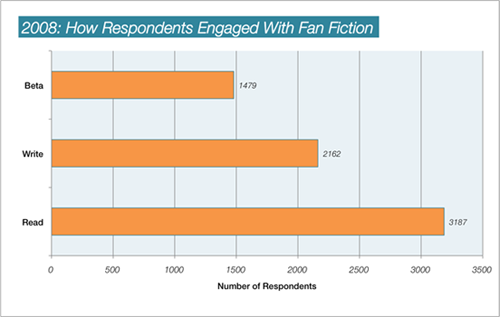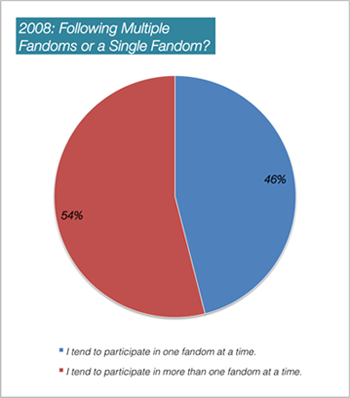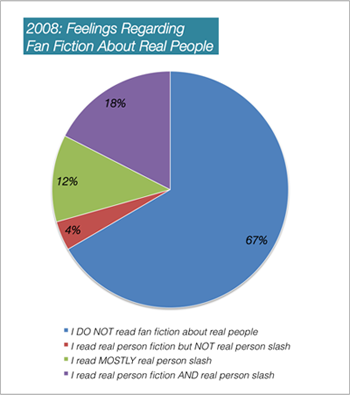Engagement
How were/are people participating in Fan Culture?
Much of the information on how survey participants were engaging with fan culture in 2008 will surprise no one. In addition to reading fan fiction, a large amount of these fans were also writing fan fiction (about 67%) and nearly half were also helping other writers by betaing fic (46%).

This chart indicates how many survey participants have read, written, or betaed fan fiction at least once. It does not tell us how regularly people did these things. It might have been once or twice a month or only every few years. Given the time commitment involved writing or betaing stories, perhaps only a smaller group can do this regularly.
When I was looking at the favorite stories and authors of the folks in the survey (see Popular Fandoms & Stories), I also noticed that many reader's favorite stories were written by authors producing lengthy stories on a fairly steady basis. Regularly producing stories may help an author become better known and assist in spreading the word about their writing. (Interestingly, authors self-publishing and selling books online today seem to be increasingly using this same method to stay in regular contact with their readers.)
What do you think about fandom participation today? Is it as easy to connect with others to write, beta and share stories these days? What about forming ongoing fan writing circles where you develop story ideas and workshop drafts? With many fans now spread out across LiveJournal, Dreamwidth, Twitter, Tumblr, Archive of Our Own, and FanFiction.net, do you find it harder to participate in fan networks or easier? Or, do today's fans participate in different ways?
What were people reading?
In 2008, the majority of the survey participants (67%) said they were reading slash (male/male) fan fiction. At 66%, gen (non-romantic) fan fiction was also really popular and het (heterosexual) fic was a strong third at 57%. Fewer participants (18%) said that they read femslash (female/female).

Slash was technically the most popular category of fan fiction in 2008, but it appears that survey participants were reading slash and gen fan fiction in fairly even amounts. At least, that's what it looked like when fans were asked about their general reading preferences. However, slash was much more heavily represented when I looked at the different stories that fans identified as their favorite works of fan fiction. (See Popular Fandoms & Stories for more on this.) Looking back, I wonder if something important was missing from my original question. I didn't ask about frequency. Sure, many people were reading many different kinds of stories, but how often did they read them? Did they have a type they read more than others? A favorite? If I had also asked how frequently participants found themselves reading different types of fan fiction, those answers might influence how we read these numbers. Given the prevalence of m/m in the favorite stories, I wonder if these fans tended to read one variety of fan fiction significantly more than others.
What about you? If you read different types of fan fiction (gen, het, slash, femslash, yaoi/boyslove, or yuri), do you have a favorite type? One you read more than others? Has this changed over time? Share what you think about this in the comments section below.
What are people reading now?

On Archive of Our Own (AO3) today, it is possible to search for and count the different types of stories posted to the archive. The chart above shows the types of fan fiction represented on AO3 today (as of December 2013). On AO3, m/m has nearly double the amount of stories that some of the other categories do. This indicates that there are a lot of people writing m/m on A03. However, it's important to read these numbers carefully and in context. This doesn't necessarily indicate that slash is more prevalent than other types of fan fiction. While AO3 is a popular archive, it isn't representative of all available fan fiction. For example, in the 2008 survey, Jane Austen related fan fiction was one of the most popular fandoms. At the time, this fandom was totally new to me, simply because I'd been so focused on fans connected to LiveJournal. At the time, Austen fans had several fan fiction archives elsewhere, exclusively dedicated to Austen-related stories. Similarly, the Whovians are often found on A Teaspoon And An Open Mind. There are countless other fan specific archives out there.
Another important factor shaping the current AO3 numbers is the archive's "adult content" policy. AO3 allows it, FanFiction.net did once but no longer does. While Fiction Alley has been a popular archive for Harry Potter fans, it doesn't allow stories with adult content either. These kinds of content policies may lead fans with shared interests to cluster on particular websites, spending more or less time on AO3, depending on their reading preferences. Adult content restrictions may also disproportionately affect the amounts of m/m or f/f content represented on different web archives. With so many different sites collecting fan fiction and catering to different groups of writers and readers, it may not ever be possible to fully map the kinds of fan fiction read by fans.
What do you notice about your fan fiction reading habits? Do you find yourself preferring a certain website, community or archive more than others? Or, do you look reading material in many different places? If you've been reading fan fiction for a while, how have the websites you visit changed over time?
What's changing about engagement today?

In the past, stories were often distributed within a fandom for a show, a pairing, a character, actor, etc. For example, stories could be shared on a fandom list-serv, in an online community dedicated to a specific pairing, posted on a dedicated fandom archive, etc. However, as media fandom increasingly used LiveJournal, this may have facilitated more long-term social links between fans across a variety of fandoms. In 2008, survey participants were almost evenly split between fans that engaged with more than one fandom at a time (54%) and fans who stuck to one fandom at a time (46%).
Today, I'm not sure what the trend is. With more media fans spread across sites like Archive of Our Own, FanFiction.net, Tumblr, and Twitter, LiveJournal, Dreamwidth, etc., I wonder if this is something that is enabling different or new reading habits. Finding stories about a particular character or a certain pairing of characters doesn't necessarily require joining one specific journal community or mailing-list any more. Instead, sites like Archive of Our Own, FanFiction.net, Tumblr, and Twitter allow fans to access many different fandom tags within a single website. This makes me wonder. Is it possible fans are reading a broader mix of fan fiction today? Are fans able to be more "multi-fannish" than they used to be?
Of course, fans connecting across different fandoms is certainly not a new thing. Fan conventions have always enabled different fans to meet each other. Fanfiction.net has provided fans with a massive multi-fandom archive of stories for over a decade now. However, many fans do not use FanFiction.net, particularly individuals who began participating in fan culture prior to FanFiction.net's launch in 1998. In contrast, AO3 seems to be breaking down some of these generational divides. It feels like a range of fans, younger and older, are using it. It also seems that they may be using it to access an array of fandoms, pairings and story types. Perhaps this signals a shift towards cross-fandom participation and a reliance on massive multi-fandom archives. But, I'm speculating here and basing this purely on my own observations. It's certainly also possible that tagging features allow fans to stick to a specific set of reading interests and avoid others.
What do you think? How are you using these websites? Do you feel like fandom specific archives and communities today are less popular than they used to be? Are fans today more multi-fannish or do websites like Archive of Our Own and FanFiction.net just help to make a fan's participation in many fandoms more visible? Share what you think about this in the comments section below.
Fan Taboos? Real People Versus Fictional Characters

In the not-so-distant past, fan fiction about real people was a pretty controversial topic in media fandoms. In 2008, 34% of the survey participants read some kind of real person fiction (RPF). The majority of participants (67%) said that they did not read stories about real people.
When this survey went out in 2008, many popular boybands were going on hiatus and the size of the celebrity-focused Popslash fandom had begun to decline. For a time however, Popslash was a large fandom with a heavy presence on LiveJournal. As popslash's popularity faded, a new music-celebrity related fandom, bandom. began to develop. Today, interest in real-person related fan fiction continues. There are fandoms for athletes, actors, musicians, news anchors, and more. While the ethics of writing and reading real-person fan fiction is still debated among some fans, the controversy it used to provoke seems to have faded.
Again, however, I'm basing this on what I've observed. As fans continue to spread out across different social media sites, perhaps there are webspaces where fans go to either find or avoid more controversial types of fan fiction. What do you think? Do you visit or avoid certain websites because of the types of fan fiction they make available? Are there types of stories today that are still taboo or has a more "live and let live" approach become the standard? Why? Share what you think about this in the comments section below.
Comments
This project seeks public comments and feedback from a wide variety of fans. Remember, these comments are being collected for research purposes. These comments and the pseudonym associated with them could potentially be used in presentations/publications associated with this research. If you are concerned, for any reason, about your public posts being connected back to you or to your pseudonym, there are ways to screen your identify further. Visit the Protecting My Identity page to initiate this process.
comments powered by Disqus